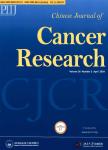Expressions of Thymidylate Synthase, Thymidine Phosphorylase, Class Ⅲ β-tubulin, and Excision Repair Cross-complementing Group 1 Predict Response in Advanced Gastric Cancer Patients Receiving Capecitabine Plus Paclitaxel or Cisplatin
Expressions of Thymidylate Synthase, Thymidine Phosphorylase, Class Ⅲ β-tubulin, and Excision Repair Cross-complementing Group 1 Predict Response in Advanced Gastric Cancer Patients Receiving Capecitabine Plus Paclitaxel or Cisplatin作者机构:Key Laboratory of Carcinogenesis and Translational Research(Ministry of Education) Department of Gastrointestinal OncologyPeking University School of Oncology Beijing Cancer Hospital & Institute Beijing 100142 China
出 版 物:《Chinese Journal of Cancer Research》 (中国癌症研究(英文版))
年 卷 期:2011年第23卷第4期
页 面:288-294页
核心收录:
学科分类:1002[医学-临床医学] 100214[医学-肿瘤学] 10[医学]
基 金:supported by the National "863" High‐Tech Res & Dev Program of China (No. 2006AA02A402) Beijing Municipal Science & Technology Commission Program "Optimization of pharmacotherapy and individual selection in gastric cancer" (No D101100050010023)
主 题:Advanced gastric cancer TS/TP/TUBB3/ERCC1 Capecitabine Paclitaxel Cisplatin
摘 要:Objective: To evaluate the role of class III β-tubulin (TUBB3), thymidylate synthase (TS), thymidine phosphorylase (TP), and excision repair cross-complementing group 1 (ERCC1) in clinical outcome of advanced gastric cancer patients receiving capecitabine plus paclitaxel or cisplatin. Methods: The clinical data and tumor specimens from 57 advanced gastric cancer patients receiving first-line capecitabine plus paclitaxel (cohort 1, n=36) and capecitabine plus cisplatin (cohort 2, n=21) were retrospectively collected, and TUBB3, TS, TP, and ERCC1 expressions were detected by real-time quantitative PCR. The associations between expressions of biomarkers and response or survival were analyzed statistically. Results: The median age of 57 patients was 57 years (range: 27–75 years) with 38 males and 19 females. Of all patients, the response rates of patients with high TP, low TP and high TS, low TS expressions were 57.1%, 27.6% (P=0.024), and 55.2%, 28.6% (P=0.042), respectively. Among cohort 1, the response rates and median overall survivals of patients with low and high TUBB3 expressions were 61.1% vs. 33.3% (P=0.095) and 13.8 months vs. 6.6 months (P=0.019), respectively; the response rate (87.5%) of patients with low TUBB3 and high TP expressions was higher than that (14.3%) of patients with high TUBB3 and low TP expressions (P=0.01). Among cohort 2, the response rates of patients with low ERCC1 and high ERCC1 expressions were 45.5% and 20.0% respectively (P=0.361). Conclusion: TUBB3, TS and TP expressions could predict the response of advanced gastric cancer patients receiving capecitabine-based and paclitaxel-based chemotherapy. These results will be further confirmed in future large samples.



